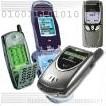You likely have a cellphone that you bought from a carrier, like AT&T, Verizon or Sprint, and that phone only works on that carrier’s cellular and data network — unless you “unlock” it.
That is a software process that allows the phone to work on other carriers if you put in a new SIM card or want to take the phone to another carrier for service.

If that sounds complicated to you and like something you wouldn’t bother with, then today’s news won’t matter to you. But if that’s something you’ve done before or have thought about doing, then you should know that starting today it is illegal to unlock a subsidized phone or tablet that’s bought through a U.S. carrier.
Why now? Starting today, the U.S. Copyright Office and Library of Congress are no longer allowing phone unlocking as an exemption under the Digital Millennium Copyright Act (DMCA).
You can read the full docket here but, in short, it is illegal to unlock a phone from a carrier unless you have that carrier’s permission to do so. If you’re wondering what this has to do with copyright, it turns out not much.
“It wasn’t a good ruling, ” Rebecca Jeschke, a digital rights analyst at the Electronic Frontier Foundation (EFF), told ABC News. “You should be able to unlock your phone. This law was meant to combat copyright infringement, not to prevent people to do what they want to do with the device they bought.”
Of course, the carriers prefer the new rule because it ties your phone to their network. U.S. cellular carriers sell phones at a subsidized or discounted rate with a contract. You pay the network for service on a monthly basis and they give you the phone for a cheaper price than it actually is worth.
When it was legal, people may have unlocked their phone to resell it when they upgraded to a newer model or to use it with an overseas carrier and take advantage of local rates when they traveled abroad.
If your phone has already been unlocked, you are grandfathered in and won’t face any legal issues. But what could happen if you unlocked your phone now that it’s illegal?
“Violations of the DMCA [unlocking your phone] may be punished with a civil suit or, if the violation was done for commercial gain, it may be prosecuted as a criminal act, ” Brad Shear, a Washington, D.C.-area attorney and blogger who is an expert on social media and technology law, told ABC News. “A carrier may sue for actual damages or for statutory damages.”
The worst-case scenario for an individual or civil offense could be as much as a $2, 500 fine. As for those planning to profit off of the act or a criminal offense — such as a cellphone reseller — the fine could be as high as $500, 000 and include prison time.
“I don’t see carriers going aggressively after people, but bottom line is that I would not recommend violating this provision of the law, ” Shear said.
Jeschke said that the EFF hasn’t heard of anybody who faced legal action during an earlier period when it was illegal to unlock phones in the U.S. before a prior rule change made it legal several years ago.
In 2015, there will be another rule making over the exemptions and, according to Jeschke, the question of the legality or illegality of unlocking a phone will likely be revisited.
Until then, your best bet is to buy an unlocked phone.
“It’s unfortunate that the copyright office walked back this exemption to the DMCA, but the carriers are already shipping unlocked devices like the iPhone 5, so the impact on average consumers won’t be too bad, ” said Nilay Patel, a former patent attorney and managing editor of The Verge.
Apple offers an unlocked iPhone 5 for $649.00 and the Nexus 4 is available for $299.99 right from Google and T-Mobile.
Or, if you’re really upset with the latest rule change, you can sign a “We the People” petition on the White House’s website that calls for the Librarian of Congress to “rescind this decision, and failing that, champion a bill that makes unlocking permanently legal.”



